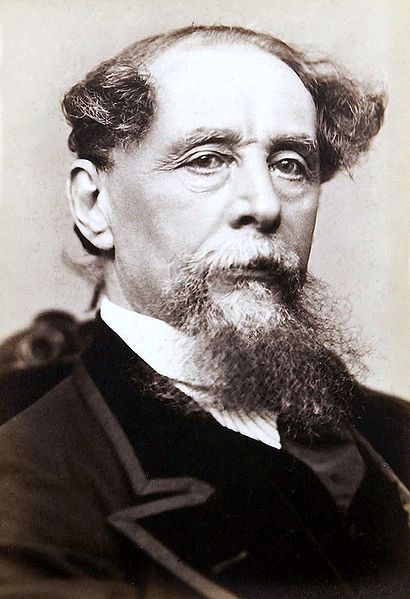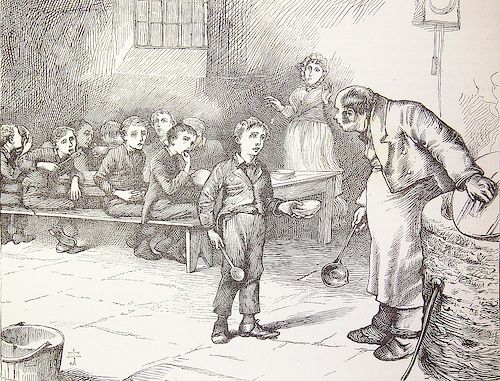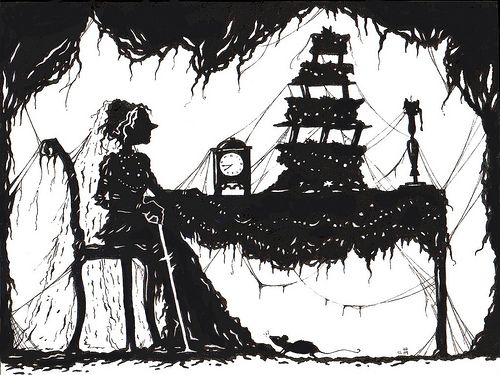"There's nothing better than a good friend, except a good friend with chocolate." ~ Linda Grayson, The Pickwick Papers (1837).

Daguerreotype by Jeremiah Gurney (circa 1867-68).
Monday, February 7th, is Charles Dickens's 198th birthday!!
He's definitely a man after my own heart. Besides his well-known proclivity for character description, here was a man who filled every one of his novels with luscious, mouth-watering, decidedly poetic descriptions of food, glorious food. Food for Dickens was not only a celebration of life, but also a social and economic statement, and yes, another means of defining character.
Illo from Oliver Twist by J. Mahoney (1857?), from jmsdson's photostream.
Who can forget little Oliver Twist, brave enough to utter the words, "Please sir, I want some more"? Or Christmas dinner at the Cratchits': "There never was such a goose. Its tenderness and flavour, size and cheapness, were the themes of universal admiration." Or what about the tragic wedding breakfast that never was (but lasted decades) in Great Expectations: 
Miss Havisham by Steering for North.
The most prominent object was a long table with a tablecloth spread on it, as if a feast had been in preparation when the house and the clocks all stopped together. An epergne or centerpiece of some kind was in the middle of this cloth; it was heavily overhung with cobwebs that its form was quite undistinguishable; and, as I looked along the yellow expanse out of which I remember its seeming to grow, like a black fungus, I saw speckled-legged spiders with blotchy bodies running home to it, and running out from it.
Poor Miss Havisham! She wins the prize for the stalest, most unpalatable breakfast in all of literature. Speaking of breakfast, Dickens mentioned it more than any other meal in his novels. While he might casually mention luncheon, afternoon tea, and supper, breakfast was often described in elaborate, loving detail. Of course, he also liked a menacing breakfast every now and then, like the one consumed by Mr. Quilp in The Old Curiosity Shop:
He ate hard eggs, shell and all, devoured gigantic prawns with the heads and tails on, chewed tobacco and water-cresses at the same time and with extraordinary greediness, drank boiling tea without winking, bit his fork and spoon till they bent again.
I wonder who his dentist was. ☺
But today's Poetry Friday, and we need a poem. One never hears too much about Dickens's poetry, perhaps because he, himself, eschewed "serious poetry." But he did write a number of song lyrics, satirical, humorous and sentimental ballads, hymns, prologues, even a comic operetta called, "The Village Coquettes" (1836).
 Add a Comment
Add a Comment
new posts in all blogs
.jpg?picon=910) By: Jama Rattigan,
on 2/5/2010
By: Jama Rattigan,
on 2/5/2010
Blog: jama rattigan's alphabet soup (Login to Add to MyJacketFlap)
JacketFlap tags: author recipe archive, poetry friday, charles dickens, pajama party, Add a tag
Viewing: Blog Posts Tagged with: author recipe archive, Most Recent at Top [Help]
Results 1 - 1 of 1
Blog: jama rattigan's alphabet soup (Login to Add to MyJacketFlap)
JacketFlap tags: author recipe archive, poetry friday, charles dickens, pajama party, Add a tag


